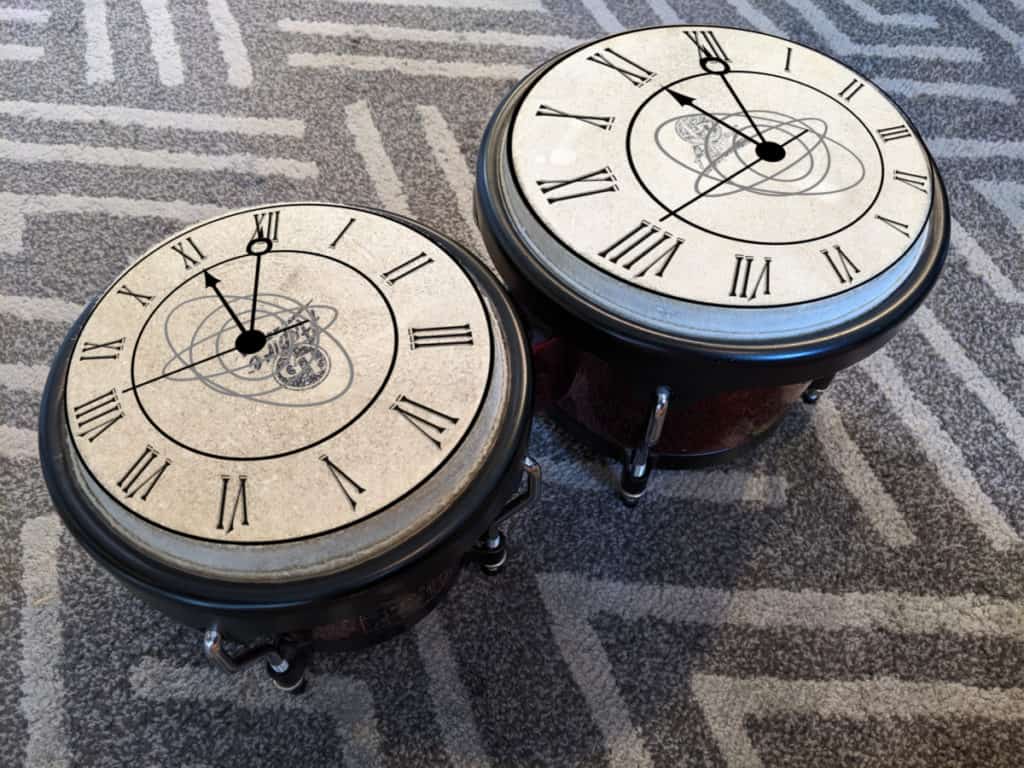This post contains affiliate links. We earn commissions if you purchase products from retailers after clicking on a link from our site. As an Amazon Associate, we earn from qualifying purchases.
So maybe you’re eyeing those bongo drums you saw at the music store for the past few weeks, but you’re not sure how much time you need to learn how to play them. How long does it take to learn to play bongos?

By the way, looking for recording equipment and musical instruments? Check out Sweetwater.com for microphones, monitors, audio interface or any other recording gear that you could ever need. (Affiliate Link)
Learning to play the bongos with traditional Afro-Cuban music will take at least two weeks of daily practice if you have prior percussion experience. Without prior percussion experience, it may take around 2 months depending on your music ability. Other music genres will take less or more time depending on their complexity.
I think it’s so cool that I get to answer this question because I’m experiencing this right now! I have some experience on a full drumset (just as a hobby), and I’ve had bongos for a long time, but I’ve only played whatever rhythms I’ve made up. At the time of this writing, I am actually spending half an hour a day learning Afro-cuban rhythms on the bongo drums every day. I’ll share the details of what I’m discovering.
I released a video showing how much someone can improve on the bongos in 30 days of practice:
How Long Does it Take to Learn Traditional Afro-Cuban Rhythms on the Bongos?
First off… just about anyone can play the bongos to some degree or another. My 5-month-old son digs playing the bongos, even though his rhythms aren’t that sophisticated yet… and don’t really follow any beat or rhythm. But hey! I’m willing to forgive him for that.
However, if you’re wanting to play the Cha-Cha bongo rhythms with your friends, or eventually Salsa someday, then be prepared to put in some effort.
The key to learning to play with Afro-Cuban music on the bongos is learning the clave. Consequently, clave in Spanish means key. Go figure, right? Many of the rhythms have the same cadence as the clave, making a foundation that makes up much of Afro-Cuban style music.
One rhythm incredibly fundamental to any aspiring bongo player wanting to play Afro-Cuban is the “martillo” (hammer in English).
How Long With Prior Percussion Experience
If you already have played the snare, the drum-set, or any other percussion instrument you have a huge advantage to learning Afro-Cuban rhythms on the bongo drums.
Having the coordination to play various rhythms, and the ability to understand basic music theory like time signatures, understanding music notation, and reading music are incredibly helpful.
That being said, bongo drums are not exactly the same as other percussion instruments. As I have freshly learned (srsly, like a couple weeks ago at the time of this writing), the martillo is a tricky rhythm. Not because the rhythm itself is difficult, but because the hand techniques are tricky to coordinate!
I spent time to learn the martillo rhythm a couple weeks ago like I mentioned, and starting at the beginning of this month, I’ve spent an hour a day practicing the bongo drums. I already have the hand coordination to play percussion rhythms, I know how to read music, and I have a good grasp of different time signatures--so I’m not starting at ground zero.
With this knowledge, I was able to learn to stumble through the martillo rhythm after about 30 minutes at a slow pace. Over the next few days I was able to solidify the basic rhythm.
Now after practicing for an extended period every day, I’m seeing that I have lots of room for improvement on technique, though, and that I’m not super comfortable yet expanding on the rhythm and being able to play it super solidly.
If you have prior percussion experience, after a couple weeks of constant practice, you can be confident you’d be able to play along with others on simpler songs.
Being able to play more complicated and fast Afro-Cuban music on the bongos with strong fills then you should expect a month and a half of solid daily practice.
To handle your own bongo solos that fit within the realm of traditional bongo styles may take even more time. (Playing random rhythms as fast as you can doesn’t count) 😉
How Long Without Prior Percussion Experience
This is much more difficult for me to assess since I have been messing with percussion for a long time. I do remember, back when I was in high school, when my friend gave me a drum set for Christmas that he had salvaged from some guy trying to clean out his garage.
This was really my first experience of sitting down and practicing through a book of drum rhythms. Within a month I was able to play a few basic beats (with scattered practice habits) and I could (kinda) keep time. At this point I could read music, making it much easier to learn to play.
Without this backbone of experience, it would take me a lot longer to learn the bongos right now.
If you have musical experience and can read music, but you do not have percussion experience, then you should expect 2 months or so to be able to play the Afro-Cuban rhythms solidly.
As you’re reading, and if you have several year of music experience–you may be thinking “how hard could it be?” and that you’ll sail through these times. You may be right! But just know that being able to stumble through a rhythm on paper is much different than playing with others keeping time. It takes a lot of practice and I know it’s cliché, but you get a feel for the music and the rhythm–and that only comes with practice.
How Long with No Musical Experience
If you are picking your first instrument to learn, congratulations! This is such an exciting moment when you choose your first instrument!
Your first instrument will always be your hardest instrument because you have to learn music in general.
Although not strictly a requirement, learning to read music will help you learn new beats and rhythms, and will help you understand complex musical patterns. Percussion sheet music has an advantage of being much simpler to learn, which is a plus if you are planning to stick with drums.
Even if you don’t learn to read music, it’s still essential to gain an understanding and feel for time signatures–learning 4/4 or 3/4 is fairly simple and will give you some headway in many of the music that we listen to–but has a drummer, learning the more complicated and tricky time signatures is very important.
If you have no prior musical experience, learning Afro-Cuban rhythms on the bongos may take you a couple months to play, but it will take you many months longer, perhaps up to a year of practicing and learning music to be able to play and understand well enough to participate in a group.
How Long Does it Take to Learn to Play Rock Rhythms on the Bongos?
Rock rhythms are so much easier on the bongos. Not only that, much of the music we listen to on the radio has emphasis on 2 and 4, so learning to play is easier because the rhythms are much more familiar.
I would expect that for all the estimates above, that you could safely halve all of them.
- With Prior Percussion Experience: 1 week of daily practice
- With No Prior Percussion Experience: 1 month of daily practice
- With No Music Experience: 1 month of daily practice to play the basic rhythms, 6 months to be able to participate in simple songs in a group.
How Hard is it to Learn the Bongos?
In summary, the bongos are one of the most accessible instruments on the planet. It is relatively easy to pick them up and learn basic rhythms that you can even play in a group. Within a month you will surely be able to play at the very least a few rhythms. Learning the basics of the bongos is fairly easy.
But if you don’t stop there, the bongos have a tremendous depth to them–the different bongo techniques combined with difficult rhythms can take months and even years to truly master.
I’d summarize and say that to get to the point where you are an intermediate player, is intermediate difficulty if you diligently practice with a metronome.
If you want to master the complicated, syncopated rolls and achieve smooth even and lightning fast rolls, then you should expect long hours of practice, making achieving expert level difficult.
